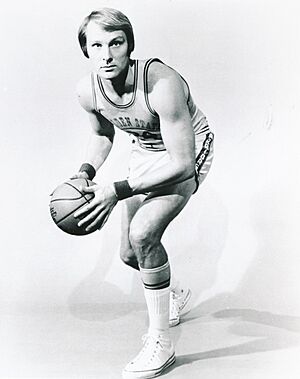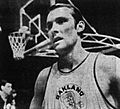Rick Barry facts for kids
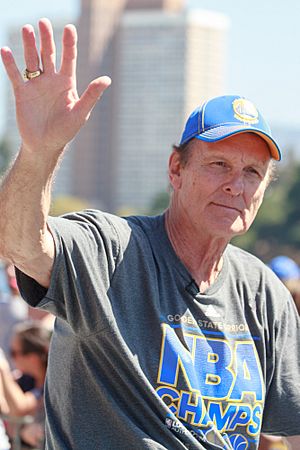
Barry at the Golden State Warriors championship parade in June 2015
|
|
| Personal information | |
|---|---|
| Born | March 28, 1944 Elizabeth, New Jersey, U.S. |
| High school | Roselle Park (Roselle Park, New Jersey) |
| Listed height | 6 ft 7 in (2.01 m) |
| Listed weight | 205 lb (93 kg) |
| Career information | |
| College | Miami (Florida) (1962–1965) |
| NBA Draft | 1965 / Round: 1 / Pick: 2nd overall |
| Selected by the San Francisco Warriors | |
| Pro career | 1965–1980 |
| Coaching career | 1992–2000 |
| Career history | |
| As player: | |
| 1965–1967 | San Francisco Warriors |
| 1968–1970 | Oakland Oaks / Washington Caps |
| 1970–1972 | New York Nets |
| 1972–1978 | Golden State Warriors |
| 1978–1980 | Houston Rockets |
| As coach: | |
| 1992 | Cedar Rapids Sharpshooters |
| 1993–1994 | Fort Wayne Fury |
| 1998–1999 | New Jersey ShoreCats |
| 2000 | Florida Sea Dragons |
| Career highlights and awards | |
|
|
| Career ABA and NBA statistics | |
| Points | 25,279 (24.8 ppg) |
| Rebounds | 6,863 (6.7 rpg) |
| Assists | 4,952 (4.9 apg) |
Richard Francis Dennis Barry III (born March 28, 1944) is a famous American former professional basketball player. He played in the NCAA, American Basketball Association (ABA), and National Basketball Association (NBA). Rick Barry is known as one of the best scorers and all-around players in basketball history.
He is the only player to lead the National Collegiate Athletic Association (NCAA), ABA, and NBA in points per game in a season. He is the all-time ABA scoring leader in both regular season (30.5 points per game) and playoff games (33.5). His 36.3 points per game in the NBA Finals are the most ever.
Barry is famous for his unique underhand free throw style. His career free throw percentage of .880 is the best in ABA history. His .900 percentage was the best in the NBA when he retired in 1980. He was inducted into the Naismith Memorial Basketball Hall of Fame in 1987. In 1996, he was named one of the 50 Greatest Players in NBA History. In October 2021, he was also chosen for the NBA 75th Anniversary Team.
Rick Barry is the father of several professional basketball players: Brent Barry, Jon Barry, Drew Barry, Scooter Barry, and Canyon Barry. His wife, Lynn Norenberg Barry, was also a great basketball player. Her jersey number was retired at the College of William & Mary.
Contents
Early Life and Baseball Love
Barry was born in Elizabeth, New Jersey, and grew up in Roselle Park, New Jersey. When he was in fifth grade, he played on the varsity basketball team, coached by his father. However, baseball was his favorite sport. He was a big fan of New York Giants star Willie Mays. Barry even skipped school once to meet Mays. He wore jersey number 24 throughout his basketball career to honor Mays. He graduated from Roselle Park High School in 1962.
College Basketball Career
Barry received over 30 scholarship offers for college. He chose the University of Miami because their basketball team played a fast, professional style. This style suited Barry's skills perfectly. While there, he met Pamela, who would become his first wife and was the daughter of the head coach.
In his first year, Barry averaged 19.0 points and 14.6 rebounds per game. By his junior year, these numbers jumped to 32.2 points and 16.6 rebounds. He became known as a very talented player.
In his final season, Barry became even more dominant. He led the country in scoring with 37.4 points per game. This was the third-highest average in NCAA history at the time. He had several games where he scored over 50 points. He also grabbed 475 rebounds, which was 18.3 per game.
His team, the Miami Hurricanes, had a great 22–4 record. However, they could not play in the NCAA tournament because of a team rule violation. This limited his national fame and his chance to be the first pick in the 1965 NBA draft.
Barry finished his college career with 2,298 points in 77 games. He still holds 15 school records, including most points and rebounds. In 1976, he was inducted into the University of Miami Sports Hall of Fame. His number 24 jersey is one of only two retired by the university.
Professional Basketball Journey
Starting with the San Francisco Warriors (1965–1967)
The San Francisco Warriors picked Barry second in the NBA draft. In his first year, the team greatly improved, almost doubling their wins. Barry was nicknamed the "Miami Greyhound" because he was tall, thin, and very quick. He won the NBA Rookie of the Year Award in the 1965–66 NBA season. He averaged 25.7 points and 10.6 rebounds per game.
The next year, Barry continued to shine. He won the MVP award at the 1967 NBA All-Star Game by scoring 38 points. He also led the NBA in scoring with 35.6 points per game. This is still one of the highest single-season averages in league history.
The Warriors made it to the playoffs. Barry played well despite a sprained ankle. In the NBA Finals, the Warriors played against the strong Philadelphia 76ers. Barry averaged an amazing 40.8 points per game in that series, which was an NBA Finals record for almost 30 years. He did this even with a knee injury that needed a pain-relieving injection before games.
Moving to the ABA (1968–1972)
Barry had some disagreements with the Warriors' owner. He then decided to join the American Basketball Association (ABA) and play for the Oakland Oaks. The Oaks offered him a huge contract. His father-in-law, Bruce Hale, became the Oaks' head coach. Barry was the first big NBA star to switch to the new ABA league.
However, because of his contract with the Warriors, courts ruled that Barry had to sit out the 1967–68 ABA season. He spent that year as part of the Oaks' broadcast team.
Oakland Oaks (1968–1969)
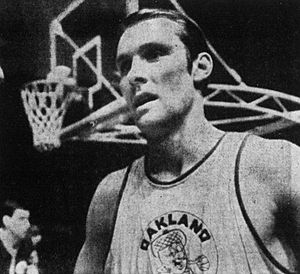
When Barry finally played for the Oaks in the 1968–69 ABA season, he quickly showed he was still a top player. He led the league with 34.0 points per game. The Oaks became the first West Coast team to win a professional basketball championship. Barry also led the league in free-throw percentage.
Unfortunately, Barry's season ended early on December 27, 1968. He tore ligaments in his left knee during a game. He tried to come back but made the injury worse. He only played 35 games but was still named to the ABA All-Star team.
Even without Barry for most of the season, the Oaks were very strong. They finished with a 60–18 record and won the Western Division. In the 1969 ABA Playoffs, they won the league title by beating the Indiana Pacers 4–1.
Washington Caps (1969–1970)
Despite winning the championship, the Oaks did not attract many fans. The team was sold and moved to Washington, D.C., becoming the Washington Caps.
Barry was not happy about playing in Washington. He missed the first 32 games of the 1969–70 ABA season. He eventually joined the team, which played in the Western Division, meaning a lot of travel. He played in 52 games and finished second in the league with 27.7 points per game. In the playoffs, Barry scored 52 points in a Game 7 loss, setting a new ABA record for points in a playoff game. This is still the most points scored in a deciding Game 7 in professional basketball history.
New York Nets (1970–1972)
After the 1969–70 season, the Washington Caps moved again and became the Virginia Squires. Barry did not want to play in Virginia. On September 1, 1970, the Squires traded Barry to the New York Nets.
Barry played 59 games in the 1970–71 ABA season due to a knee injury but still made the ABA All-Star team. He led the league in scoring with 29.4 points per game. He repeated as an ABA All-Star and scoring leader (31.5 points per game) in the 1971–72 ABA season. He also led the ABA in free throw percentage in both of these years. Barry set an ABA record by making 23 consecutive free throws in one game.
In the 1972 ABA Finals, the Nets were defeated by the Indiana Pacers. On October 6, 1972, Barry was released by the Nets and returned to the Golden State Warriors.
Golden State Warriors (1972–1978)
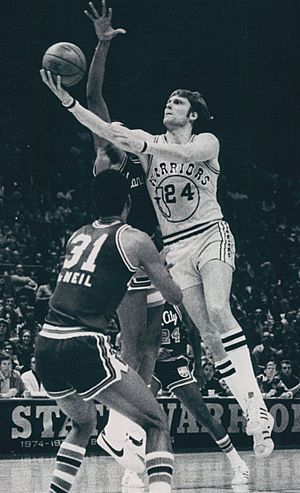
When Barry returned to the Warriors and the NBA, he changed his playing style. He became a "point forward," meaning he took on a role similar to a point guard, helping to set up the team's offense. On March 26, 1974, he scored a career-high 64 points and grabbed 10 rebounds in a win against the Portland Trail Blazers.
Before the 1974–75 NBA season, his teammates chose Barry as their captain. He had the best all-around season of his career, averaging 30.6 points per game. He led the league in free throw percentage (.904) and steals per game (2.9). He also ranked sixth in assists per game (6.2), which was unusual for a forward.
In the 1975 NBA Finals, the Warriors faced the Washington Bullets. The Warriors won the series in four games, surprising many. Barry was named NBA Finals Most Valuable Player. He averaged 29.5 points, 5.0 assists, and 3.5 steals per game in the Finals.
In the 1975 NBA draft, the Warriors picked point guard Gus Williams. Barry's scoring average dropped to 21.0 points per game in the 1975–76 NBA season.
In the 1976–77 NBA season, the Warriors won 46 games but were eliminated in the second round of the playoffs. Barry averaged 23.1 points per game in his last season with the Warriors (1977–78).
Houston Rockets (1978–1980)
Barry finished his career with the Houston Rockets, playing until the 1979–80 NBA season. He joined the Rockets in June 1978. Since Moses Malone already wore number 24, Barry wore number 2 at home and number 4 on the road.
In his Rockets debut, Barry took on a new role as the first player to come off the bench. He became the first true small forward to reach 500 assists in a season, finishing with a career-high 502. He averaged 13.5 points per game and set a new NBA record (since broken) with a .947 free throw percentage.
Barry's final season was less successful. The Rockets lost to the Celtics in the 1980 Eastern Conference semifinals. After failing to agree on a new contract, he decided to retire.
Coaching Career
After his playing career, Barry became a coach. In 1992, he coached the Cedar Rapids Sharpshooters in the Global Basketball Association (GBA). His team had the best record in the league (12–4) before the GBA closed down.
In 1993, Barry became the head coach for the Fort Wayne Fury in the Continental Basketball Association (CBA). He also coached in the United States Basketball League (USBL) for the New Jersey ShoreCats (1998–1999) and the Florida Sea Dragons (2000).
Life After Playing
Barry is a part-owner and promoter for Ektio basketball shoes. These shoes were designed to help prevent ankle injuries. He also serves on the company's board of directors. In 2005, he finished second in his division at the World Long Drive Championship, a golf competition.
Broadcasting Career
Rick Barry was one of the first professional basketball players to become a successful broadcaster. He started broadcasting Oakland Oaks games in 1967–68. He continued working in broadcasting for many years, including for CBS and TBS.
He hosted a sports talk show on KNBR radio in San Francisco from 2001 to 2006.
Personal Life
Rick Barry has Irish, English, French, and Lithuanian heritage. He grew up Catholic and later became a Methodist.
As of 2017, Barry lives in Colorado Springs, Colorado, with his wife, Lynn Norenberg Barry.
He has four sons and a daughter with his first wife, Pam: Scooter, Jon, Brent, Drew, and Shannon. All of his sons became professional basketball players. Rick Barry is the only NBA player to have three sons (Jon, Brent, and Drew) also play in the NBA. He wrote a book about his life called Confessions of a Basketball Gypsy: The Rick Barry Story in 1972. With his third wife, Lynn, he has another son, Canyon, who is also a professional player.
When his son Brent won the NBA Championship in 2005 with the San Antonio Spurs, Rick and Brent became the second father-son duo to both win NBA Championships as players. This has since happened with other father-son pairs in the NBA.
Jon and Brent Barry have also become broadcasters after retiring from playing.
Career Achievements
- Roselle Park High School – Roselle Park, New Jersey (1957–1961)
- Two-time All-State selection
- University of Miami (1961–1965)
- Consensus All-America (1965)
- Led the nation in scoring (37.4 ppg) as a senior
- NBA San Francisco Warriors (1965–1967)
- NBA Rookie of the Year (1966)
- NBA All-Rookie First Team (1966)
- NBA leading scorer in 1967 (35.6 ppg)
- ABA leading scorer in 1969 (34.0 ppg)
- NBA highest free-throw percentage 1973, 1975, 1976, 1978, 1979, 1980
- ABA highest free-throw percentage 1969, 1971, 1972
- NBA All-Star Game MVP (1967)
- ABA Oakland Oaks (1968–1969)
- ABA Washington Caps (1969–1970)
- ABA New York Nets (1970–1972)
- NBA Golden State Warriors (1972–1978)
- All-NBA Second Team (1973)
- NBA Finals MVP (1975)
- NBA champion (1975)
- NBA Houston Rockets (1978–1979)
- All-NBA First Team (1966, 1967, 1974, 1975, 1976)
- Eight-time NBA All-Star (1966, 1967, 1973–1978)
- ABA All-Star First Team (1969–1972)
- NBA 50 Greatest Players (1996)
- NBA 75 Greatest Players (2021)
- Bay Area Sports Hall of Fame (1988)
- Sports Hall of Fame of New Jersey (1994)
- University of Miami Sports Hall of Fame (1976)
- Golden Plate Award of the American Academy of Achievement (1975)
- 15 games in NBA career scoring 50 or more points (5th in NBA history)
- 115 games in professional career scoring 40 or more points — 70 NBA, 45 ABA (4th in professional basketball history after Wilt Chamberlain, Michael Jordan, and Kobe Bryant)
NBA Records
Regular Season Records
- He is the only player in history to lead the NCAA, ABA, and NBA in scoring in a season.
- Led the NCAA in scoring in 1964–65 (37.4 points per game).
- Led the NBA in scoring in 1966 (35.6 points per game).
- Led the ABA in scoring in 1968 (34.0 points per game).
- Youngest player to score 57 points in a game: December 14, 1965 (57 points, San Francisco Warriors vs. New York Knicks).
- Most consecutive free throws in an ABA game: 23, on February 7, 1969.
- Most assists by a forward in a game: 19, on November 30, 1976.
Playoff Records
- Scored 30 or more points in every game of a playoff series: 6 games, vs. Philadelphia 76ers, 1967 NBA Finals.
- Most points in a 7-game ABA series: 281, vs. Denver Rockets, 1970 Semifinals.
- Most points scored in a Game 7 of any ABA-NBA playoff series: 52, on April 28, 1970.
- Most field goal attempts in a 6-game series: 235, vs. Philadelphia 76ers, 1967 NBA Finals.
- Most field goal attempts in a game: 48, vs. Philadelphia 76ers, April 18, 1967.
- Most steals in a quarter: 4, second quarter, on May 11, 1975 (tied with many others).
NBA Finals Records
- Highest career scoring average: 36.3 points per game.
- Scored 30 or more points in every game of a championship series: 6 games, vs. Philadelphia 76ers, 1967 NBA Finals (tied with other players).
- Most field goals made in a game: 22, vs. Philadelphia 76ers, April 18, 1967 (tied with Elgin Baylor).
- Most field goal attempts in a 6-game series: 235, vs. Philadelphia 76ers, 1967 NBA Finals.
- Most field goal attempts in a game: 48, vs. Philadelphia 76ers, April 18, 1967.
- Most field goal attempts in a quarter: 17, on April 14, 1967.
- Most steals in a 4-game series: 14, vs. Washington Bullets, 1975 NBA Finals (3.5 steals per game).
NBA All-Star Game Records
- Highest career steals average: 3.2.
- Most field goal attempts in a game: 27 (1967).
- Most steals in a game: 8 (1975).
- Most personal fouls in a game: 6, twice (1966, 1978).
- Most disqualifications in a career: 2 (tied with Bob Cousy).
Images for kids
See also
 In Spanish: Rick Barry para niños
In Spanish: Rick Barry para niños
 | Selma Burke |
 | Pauline Powell Burns |
 | Frederick J. Brown |
 | Robert Blackburn |


